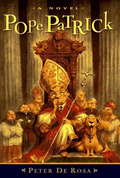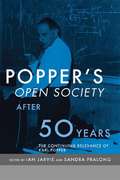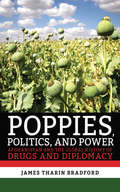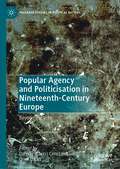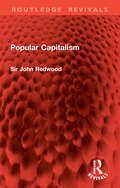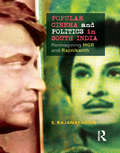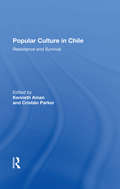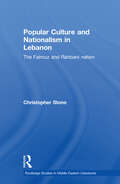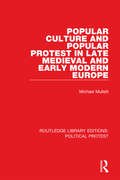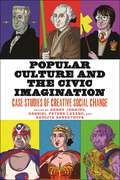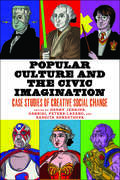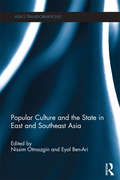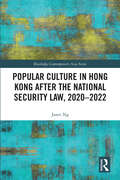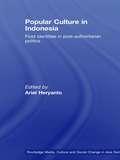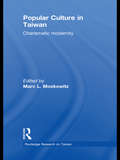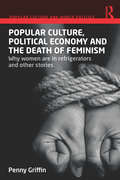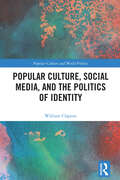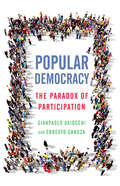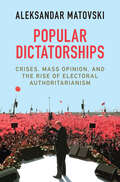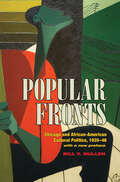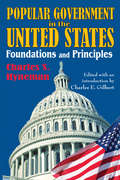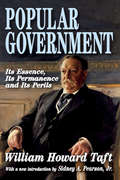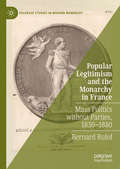- Table View
- List View
Pope Patrick
by Peter De RosaThe year is 2009. America has its first Catholic president since Kennedy. The planet's other superpower is the Federation of Islamic Republics, stretching from Morocco to Pakistan. And in Rome, the aging Polish Pope, obstinate and combative to the end, has died, and the conclave of cardinals must choose a successor. After a great deal of argument and debate, they choose the least controversial candidate, the least political, the one least likely to upset the Vatican status quo--Brian O'Flynn, a kindly old Irish priest who reads Yeats and publishes obscure academic theses. At the moment of his election, a 300-pound ornamental pillar falls on his head. Then all hell breaks loose. Pope Patrickis the riotous story of a mild-mannered country cardinal who--through a democratic election, a twist of fate, and a little help from his golden Lab, Charley--turns the Vatican upside down and throws the industrial world into chaos. He deals once and for all with the thorny issues of contraception, the celibacy of the clergy, and the infallibility of the pope; sends the Dow Jones tumbling, and the hopes of the downtrodden soaring-and in the process brings the world to the brink of catastrophe. By turns funny, tender, exciting, and controversial,Pope Patrickis a scathingly brilliant, delightfully droll novel of principles, power, and faith-the story of the holiest, bravest, most likable pope since St. Peter.
Popper's Open Society After Fifty Years
by Ian Jarvie Sandra PralongPopper's Open Society After Fifty Years presents a coherent survey of the reception and influence of Karl Popper's masterpiece The Open Society and its Enemies over the fifty years since its publication in 1945, as well as applying some of its principles to the context of modern Eastern Europe.This unique volume contains papers by many of Popper's contemporaries and friends, including such luminaries as Ernst Gombrich, in his paper 'The Open Society and its Enemies: Remembering its Publication Fifty Years Ago'.
Poppies, Politics, and Power: Afghanistan and the Global History of Drugs and Diplomacy
by James Tharin BradfordHistorians have long neglected Afghanistan's broader history when portraying the opium industry. But in Poppies, Politics, and Power, James Tharin Bradford rebalances the discourse, showing that it is not the past forty years of lawlessness that makes the opium industry what it is, but the sheer breadth of the twentieth-century Afghanistan experience. Rather than byproducts of a failed contemporary system, argues Bradford, drugs, especially opium, were critical components in the formation and failure of the Afghan state.In this history of drugs and drug control in Afghanistan, Bradford shows us how the country moved from licit supply of the global opium trade to one of the major suppliers of hashish and opium through changes in drug control policy shaped largely by the outside force of the United States. Poppies, Politics, and Power breaks the conventional modes of national histories that fail to fully encapsulate the global nature of the drug trade. By providing a global history of opium within the borders of Afghanistan, Bradford demonstrates that the country's drug trade and the government's position on that trade were shaped by the global illegal market and international efforts to suppress it. By weaving together this global history of the drug trade and drug policy with the formation of the Afghan state and issues within Afghan political culture, Bradford completely recasts the current Afghan, and global, drug trade.
Popular Agency and Politicisation in Nineteenth-Century Europe: Beyond the Vote (Palgrave Studies in Political History)
by Diego Palacios Cerezales Oriol LujánThis book provides an entry point to the most cutting-edge lines of research on popular political mobilisation in Europe. It brings together leading scholars from Germany, France, Britain, the Netherlands and Spain. The chapters explore the connected dimensions of popular participation within different countries and across borders, covering the topics of iconoclasm, popular acclamations, street politics, associations, petitions and electoral agitation. Focusing on the role of disenfranchised citizens and women, this collection broadens the themes of traditional political historical research that has identified political participation with the right to vote and struggles for political inclusion, and brings a wide array of formal and informal political practices to the centre of nineteenth-century European life. A must-read for scholars, undergraduates, and graduate students wishing to explore multiple dimensions of the history of political engagement and politicisation.
Popular Capitalism (Routledge Revivals)
by Sir John RedwoodSir John Redwood has been at the centre of the movement to speed up the growth in wealth and income around the world through the rediscovery of private enterprise. In the United Kingdom, he has argued and written for privatisation, deregulation, and wider ownership—policies he helped to implement as a government adviser and as Head of the Prime Minister’s Policy Unit. Elsewhere, in countries as diverse as Jamaica, New Zealand, Singapore, and France, he has advised governments on industrial policies and privatisation and has supervised major share issues.In Popular Capitalism (first published in 1988 and now with a new preface by the author) Redwood draws on his wide-ranging experience to illustrate major economic changes happening around the world. He shows that privatisation, deregulation, venture capital, wider ownership, debt repayment and the growth of new markets are all scenes in a larger drama: the story of how the world is responding to the failure of public sector led growth and to the overburdening of debt that has so damaged countries, companies, and even banks. Popular capitalism is a worldwide phenomenon, embracing Latin America, Gorbachev’s reforms, China’s own style of local capitalism, and the large government privatisation programmes of the developed world.
Popular Cinema and Politics in South India: The Films of MGR and Rajinikanth
by S. RajanayagamThis work breaks new ground in the understanding of South Indian cinema and politics. Through incisive analysis and original concepts it illustrates the private, public and cinematic personas of MGR and Rajinikanth. It challenges the popular and scholarly myths surrounding them and shows the constant negotiation of their on-screen and off-screen identities. The book revisits the entire political history of post-Independent Tamil Nadu through its cinema,and presents a refreshing psycho-political and cultural map of contemporary South India. This absorbing volume will be an important read for scholars, teachers and students of film studies, culture and media studies, and politics, especially those interested in South India.
Popular Culture In Chile: Resistance And Survival
by Kenneth Aman Cristian ParkerFirst published in 1991. An implicit thesis of this volume is that popular culture in Chile is more than the total of many individual biographies. It requires a new analysis of society as a whole and of social change. Too often, political scientists and other social analysts have seen social change as proceeding from the top down. One can interpre
Popular Culture and Nationalism in Lebanon: The Fairouz and Rahbani Nation (Routledge Studies in Middle Eastern Literatures #Vol. 18)
by Christopher StoneBased on an award-winning thesis, this volume is a pioneering study of musical theatre and popular culture and its relation to the production of identity in Lebanon in the second half of the twentieth century. In the aftermath of the departure of the French from Lebanon and the civil violence of 1958, the Rahbani brothers (Asi and Mansour) staged a series of folkloric musical theatrical extravaganzas at the annual Ba‘labakk festival which highlighted the talents of Asi’s wife, the Lebanese diva Fairouz, arguably the most famous living Arab singer. The inclusion of these folkloric vignettes into the festival’s otherwise European dominated cultural agenda created a powerful nation-building combination of what Partha Chatterjee calls the ‘appropriation of the popular’ and the ‘classicization of tradition.’ The Rahbani project coincides with the confluence of increasing internal and external migration in Lebanon, as well as with the rapid development of mass media technology, of which the Ba'labakk festival can be seen as an extension. Employing theories of nationalism, modernity, globalism and locality, this book shows that these factors combined to give the project a potent identity-forming power. Popular Culture and Nationalism in Lebanon is the first study of Fairouz and the Rahbani family in English and will appeal to students and researchers in the field of Middle East studies, Popular culture and musical theatre.
Popular Culture and Popular Protest in Late Medieval and Early Modern Europe (Routledge Library Editions: Political Protest #16)
by Michael MullettThis book, first published in 1987, looks at the culture of the masses and at the political language and actions of the crowd. It examines the enduring traits of a European demotic culture that was largely non-literate, and it then goes on to show how the political outlook of the lower classes arose from the moral attitudes contained in their culture, a culture that was deeply suffused by Christianity. Unlike upper-class culture, popular culture is resistant to change and has to be studied over a long period – in this case the fourteenth through the seventeenth centuries. Because its themes – popular social values, riot and revolt – are pervasive over both time and space, the book’s geographical coverage is extensive, taking in most of western and central Europe.
Popular Culture and the Civic Imagination: Case Studies of Creative Social Change
by Henry Jenkins William Proctor Elisabeth Soep Jonathan Gray Stephen Duncombe Sarah Banet-Weiser Ethan Zuckerman Rebecca Wanzo Sam Ford Sangita Shresthova Candis Callison Michael Saler Manisha Pathak-Shelat Gabriel Peters-Lazaro Christopher Harris Joan Miller Clifford Lee Thomas J Billard Lauren Levitt Taylor Cole Miller Raffi Sarkissian Sarah Van Wart Tapan Parikh Emilia Yang Andrea Alarcón Diana Lee Brooklyne Gipson Jocelyn Kelvin Donna Do-own Kim Yomna Elsayed Sulafa Zidani Rachel E. Moran Paromita Sengupta Clint Schnekloth Ioana Mischie Rogelio Alejandro LopezWinner, 2021 Ray and Pat Browne Edited Collection Award, given by the Popular Culture AssociationHow popular culture is engaged by activists to effect emancipatory political change One cannot change the world unless one can imagine what a better world might look like. Civic imagination is the capacity to conceptualize alternatives to current cultural, social, political, or economic conditions; it also requires the ability to see oneself as a civic agent capable of making change, as a participant in a larger democratic culture. Popular Culture and the Civic Imagination represents a call for greater clarity about what we’re fighting for—not just what we’re fighting against. Across more than thirty examples from social movements around the world, this casebook proposes “civic imagination” as a framework that can help us identify, support, and practice new kinds of communal participation. As the contributors demonstrate, young people, in particular, are turning to popular culture—from Beyoncé to Bollywood, from Smokey Bear to Hamilton, from comic books to VR—for the vernacular through which they can express their discontent with current conditions.A young activist uses YouTube to speak back against J. K. Rowling in the voice of Cho Chang in order to challenge the superficial representation of Asian Americans in children’s literature. Murals in Los Angeles are employed to construct a mythic imagination of Chicano identity. Twitter users have turned to #BlackGirlMagic to highlight the black radical imagination and construct new visions of female empowerment. In each instance, activists demonstrate what happens when the creative energies of fans are infused with deep political commitment, mobilizing new visions of what a better democracy might look like.
Popular Culture and the Civic Imagination: Case Studies of Creative Social Change
by Henry Jenkins Sangita Shresthova Gabriel Peters-LazaroHow popular culture is engaged by activists to effect emancipatory political change One cannot change the world unless one can imagine what a better world might look like. Civic imagination is the capacity to conceptualize alternatives to current cultural, social, political, or economic conditions; it also requires the ability to see oneself as a civic agent capable of making change, as a participant in a larger democratic culture. Popular Culture and the Civic Imagination represents a call for greater clarity about what we’re fighting for—not just what we’re fighting against. Across more than thirty examples from social movements around the world, this casebook proposes “civic imagination” as a framework that can help us identify, support, and practice new kinds of communal participation. As the contributors demonstrate, young people, in particular, are turning to popular culture—from Beyoncé to Bollywood, from Smokey Bear to Hamilton, from comic books to VR—for the vernacular through which they can express their discontent with current conditions.A young activist uses YouTube to speak back against J. K. Rowling in the voice of Cho Chang in order to challenge the superficial representation of Asian Americans in children’s literature. Murals in Los Angeles are employed to construct a mythic imagination of Chicano identity. Twitter users have turned to #BlackGirlMagic to highlight the black radical imagination and construct new visions of female empowerment. In each instance, activists demonstrate what happens when the creative energies of fans are infused with deep political commitment, mobilizing new visions of what a better democracy might look like.
Popular Culture and the State in East and Southeast Asia (Routledge Studies in Asia's Transformations)
by Nissim Otmazgin Eyal Ben-AriThis volume examines the relations between popular culture production and export and the state in East and Southeast Asia including the urban centres and middle-classes of Taiwan, South Korea, Japan, Singapore, Indonesia, Malaysia, China, Thailand, and the Philippines. It addresses the shift in official thinking toward the role of popular culture in the political life of states brought about by the massive circulation of cultural commodities and the possibilities for attaining "soft power". In contrast to earlier studies, this volume pays particular attention to the role of states and cross-state cultural interactions in these processes. It is the first major attempt to look at these issues comparatively and to provide an important corrective to the limitations of existing scholarship on popular culture in Asia that have usually neglected its political aspects. As part of this move, the essays in this volume suggest a widening of disciplinary perspectives. Hitherto, the preponderance of relevant studies has been in cultural and media fields, anthropology or history. Here the contributors explicitly draw on other disciplinary perspectives – political science and international relations, political economy, law, and policy studies – to explore the complex interrelationships between the state, politics and economics, and popular culture. This book will be of interest to students and scholars of Asian culture, society and politics, the sociology of culture, political science and media studies.
Popular Culture in Hong Kong After the National Security Law, 2020–2022 (Routledge Contemporary Asia Series)
by Janet NgIn this study, Ng examines the aftermath of the massive protests in 2019 and the implementation of the National Security Law in Hong Kong.Despite 2 years of fluctuating COVID measures and social constraints, the city witnessed an unparalleled cultural resurgence after the enactment of the National Security Law in 2020. This book explores Hong Kong beyond the end of the Anti-Extradition Bill Movement in 2019, to examine what happened afterward, how society repaired itself, how the people of the city resumed their everyday life, and what this everyday life entails. Ng examines the social debates and conversations during these 2 years, analyzing a wide range of creative projects in the city, from television shows, popular music, and social media to literary writings. She describes the difficulties, emotional experiences, and also daily strategies to repair local life, recreate a self-identity, and reclaim the city’s narrative against the pressures from China.This book is a valuable resource for researchers, scholars, students, and general readers interested in popular culture and society, and the global uprisings of the first decades of the twenty-first century. The study, supported by detailed research, also makes this essential reading for those with a specialized interest in global studies, and China and Hong Kong studies.
Popular Culture in Indonesia: Fluid Identities in Post-Authoritarian Politics (Media, Culture and Social Change in Asia)
by Ariel HeryantoThis book examines popular culture in Indonesia, the world’s most populous Muslim nation, and the third largest democracy. It provides a full account of the key trends since the collapse of the authoritarian Suharto regime (1998), a time of great change in Indonesian society more generally. It explains how one of the most significant results of the deepening industrialization in Southeast Asia since the 1980s has been the expansion of consumption and new forms of media, and that Indonesia is a prime example of this development. It goes on to show that although the Asian economic crisis in 1997 had immediate and negative impacts on incumbent governments, as well as the socioeconomic life for most people in the region, at the same time popular cultures have been dramatically reinvigorated as never before. It includes analysis of important themes, including political activism and citizenship, gender, class, age and ethnicity. Throughout, it shows how the multilayered and contradictory processes of identity formation in Indonesia are inextricably linked to popular culture. This is one of the first books on Indonesia's media and popular culture in English. It is a significant addition to the literature on Asian popular culture, and will be of interest to anyone who is interested in new developments in media and popular culture in Indonesia and Asia.
Popular Culture in Taiwan: Charismatic Modernity (Routledge Research On Taiwan Ser.)
by Marc L. MoskowitzThe growing field of popular culture studies in Taiwan can be divided into two distinct academic trends; a different analytical framework is used to examine either locally oriented popular culture or transnational pop culture. This volume combine these two academic trends, firstly by revealing that localized popular culture in Taiwan is in many ways a merging of Chinese, Japanese, American, and indigenous cultures and therefore is a form of hybridity that arose long before the term became popular. Secondly, the chapters show that the transnational character of Taiwan’s pop culture is one of the more important ways that it distinguishes itself from mainland China. In other words, it is precisely Taiwan’s transnational hybrid character that helps to define it as a distinctive local space. The contributors explore how traditional Chinese influences modern localized lives in Taiwan, localized identity, culture, and politics as a contested domain with Chinese and traditional Taiwanese identities and Taiwan’s localization process as contesting Taiwan’s gravitation towards globalized Western culture. Including chapters on baseball, poetry, pop music, puppets and Harry Potter, Popular Culture in Taiwan is an accessible and stimulating read for those studying the culture and society of Taiwan and China as well as cultural studies more generally.
Popular Culture, Political Economy and the Death of Feminism: Why women are in refrigerators and other stories (Popular Culture and World Politics)
by Penny GriffinWhile some have argued that we live in a ‘postfeminist’ era that renders feminism irrelevant to people’s contemporary lives this book takes ‘feminism’, the source of eternal debate, contestation and ambivalence, and situates the term within the popular, cultural practices of everyday life. It explores the intimate connections between the politics of feminism and the representational practices of contemporary popular culture, examining how feminism is ‘made sensible’ through visual imagery and popular culture representations. It investigates how popular culture is produced, represented and consumed to reproduce the conditions in which feminism is valued or dismissed, and asks whether antifeminism exists in commodity form and is commercially viable. Written in an accessible style and analysing a broad range of popular culture artefacts (including commercial advertising, printed and digital news-related journalism and commentary, music, film, television programming, websites and social media), this book will be of use to students, researchers and practitioners of International Relations, International Political Economy and gender, cultural and media studies.
Popular Culture, Social Media, and the Politics of Identity (Popular Culture and World Politics)
by William ClaptonPopular Culture, Social Media, and the Politics of Identity advances a novel methodological approach – pop culture as political object – to capture the centrality of popular culture as an object of a broad range of political contests and debates that constitute pop culture artefacts by generating and informing specific meanings and understandings of them.It is no longer novel to claim that popular culture matters to world politics. The literature on Popular Culture and World Politics (PCWP) has demonstrated the cultural basis of political action and meaning-making. However, this book argues that in doing so, the PCWP literature has focused primarily on the traditionally narrow range of issues, actors, and things that mainstream International Relations regards as part of world politics. While PCWP challenges restrictive disciplinary understandings of the sites of legitimate inquiry where one can purposefully gain knowledge about world politics, comparatively little has been done to challenge constricted understandings of what world politics is, who it involves, and where it takes place. Methodological approaches in the literature largely treat popular culture and politics as separate and therefore focus on understanding how popular culture relates to and intersects with a relatively circumscribed notion of world politics. Focusing on the everyday politics of how audiences perceive and contest popular cultural artefacts, this book demonstrates that pop culture does not merely intersect with or reflect discrete political processes; it is also directly situated as an object of politics. The author analyses current debates over identity politics across a range of contemporary pop cultural artefacts, including films and video games.This book will be of interest to scholars and students of International Relations, Political Science, and Cultural and Media Studies.
Popular Democracy: The Paradox of Participation
by Gianpaolo Baiocchi Ernesto GanuzaLocal participation is the new democratic imperative. In the United States, three-fourths of all cities have developed opportunities for citizen involvement in strategic planning. The World Bank has invested $85 billion over the last decade to support community participation worldwide. But even as these opportunities have become more popular, many contend that they have also become less connected to actual centers of power and the jurisdictions where issues relevant to communities are decided. With this book, Gianpaolo Baiocchi and Ernesto Ganuza consider the opportunities and challenges of democratic participation. Examining how one mechanism of participation has traveled the world--with its inception in Porto Alegre, Brazil, and spread to Europe and North America--they show how participatory instruments have become more focused on the formation of public opinion and are far less attentive to, or able to influence, actual reform. Though the current impact and benefit of participatory forms of government is far more ambiguous than its advocates would suggest, Popular Democracy concludes with suggestions of how participation could better achieve its political ideals.
Popular Dictatorships: Crises, Mass Opinion, and the Rise of Electoral Authoritarianism
by Aleksandar MatovskiElectoral autocracies – regimes that adopt democratic institutions but subvert them to rule as dictatorships – have become the most widespread, resilient and malignant non-democracies today. They have consistently ruled over a third of the countries in the world, including geopolitically significant states like Russia, Turkey, Venezuela, Egypt, Indonesia, Nigeria and Pakistan. Challenging conventional wisdom, Popular Dictators shows that the success of electoral authoritarianism is not due to these regimes' superior capacity to repress, bribe, brainwash and manipulate their societies into submission, but is actually a product of their genuine popular appeal in countries experiencing deep political, economic and security crises. Promising efficient, strong-armed rule tempered by popular accountability, elected strongmen attract mass support in societies traumatized by turmoil, dysfunction and injustice, allowing them to rule through the ballot box. Popular Dictators argues that this crisis legitimation strategy makes electoral authoritarianism the most significant threat to global peace and democracy.
Popular Fronts: Chicago and African-American Cultural Politics, 1935-46
by Bill V MullenThe Communist International's Popular Front campaign of the 1930s brought to the fore ideas that resonated in Chicago's African American community. Indeed, the Popular Front not only connected to the black experience of the era, but outlasted its Communist Party affiliation to serve as both model and inspiration for a postwar cultural insurrection led by African Americans. With a new preface Bill V. Mullen updates his dynamic reappraisal of a critical moment in American cultural history. Mullen's study includes reassessments of the politics of Richard Wright's critical reputation and a provocative reading of class struggle in Gwendolyn Brooks' A Street in Bronzeville. He also takes an in-depth look at the institutions that comprised Chicago's black popular front: the Chicago Defender, the period's leading black newspaper; Negro Story, the first magazine devoted to publishing short stories by and about African Americans; and the WPA-sponsored South Side Community Art Center.
Popular Government in the United States: Foundations and Principles
by Charles HynemanPolitical theory consists in clarification of language and concepts, in description and analysis of institutions and behavior, and in appraisal and evaluation of political events. Hyneman's theory is not one of the behavioral or functional varieties that rely on special language and concepts drawn from other disciplines than political science. It emphasizes a central concern of both conventional and behavioral theory: the distribution of "power," or what proportion of people have influence over what aspects of government. He is also interested in how power is shared, divided, checked, and balanced.The main task of political theory, Hyneman thinks, is clarification of the values served by and sustaining American democracy. This task gives meaning and direction to analysis of the elements of democracy and to empirical research on the processes of democracy. In this sense political science is not "value-free"; it is most useful in pursuit of the implications of basic beliefs and ideals. These beliefs and ideals can be found in historical statements as well as inferred from institutions and behavior.Hyneman's emphasis on popular control, electoral politics, and equality of influence tends to challenge both of the "pluralist" and "ruling elite" schools-though it should be clear that he is not engaged in a scholastic debate. The freedom of his analysis, ranging from specific reference to the professional controversies of his day is one of its strengths and a probable source of originality. He connects it explicitly to the literature of political science at critical points, as it existed when originally published in 1968.
Popular Government: Its Essence, Its Permanence and Its Perils
by William Howard TaftThe modern presidency is increasingly seen as in trouble by all sides of the political spectrum and by people of the most diverse political views. Understanding why this is the case requires examining the basic principles of the presidency itself, and there is no better place to start than William Howard Taft's Popular Government. His views on executive power and constitutional interpretation of this power are not rooted in nostalgia. Instead, Taft describes how and why the Progressive Movement marked one of the major turning points in American political thought.Taft wrote out of concern over the nature of the American system itself. He sought to describe the founding principles of the country, arguing that grasping these is essential for Americans' understanding of themselves as a people and for their daily exercise of citizenship. The concerns he addressed remain central today. Th at is because Taft's quarrels with the liberal-progressive tradition in politics have not yet completely played themselves out, either in academic life, or in the political arena.In a brilliant new introduction, Sidney Pearson argues that neither Roosevelt nor Wilson should be viewed as enemies of free government by any serious student of American political thought, nor should Taft be so regarded either. The concerns Taft engages remain important for any understanding of the problems that confront the American experiment in popular government. Popular Government is a basic introduction to debate about the nature of the presidency and the larger constitutional context in which such arguments take place. Th ere is no better way to gain perspective on the debate than reading this volume.
Popular Images of American Presidents
by William C. SpragensHow our Presidents are rated by various groups.
Popular Legitimism and the Monarchy in France: Mass Politics without Parties, 1830–1880 (Palgrave Studies in Modern Monarchy)
by Bernard RulofThis book explores mid-nineteenth-century French legitimism and the implications of popular support for a movement that has traditionally been portrayed as an aristocratic force intent on restoring the Old Regime. This type of monarchism has often been understood as a form of elitist patronage politics or, alternatively, identified with ultramontane Catholicism. Although historians have offered a more nuanced view in the last few decades, their work, nevertheless, has predominantly focused on legitimist leaders rather than their followers and their professed feelings of loyalty to monarchy and monarch. This book’s originality therefore is twofold: firstly as an analysis of popular rather than élite monarchism; and secondly, as a study which portrays this form of royalism as a political movement characteristic of a period which saw the emergence of mass politics, while parties were still non-existent. It not only discusses the social and cultural settings of (popular) monarchism, but also contributes to the history of political parties, citizenship and democracy.
Popular Mechanics Who's Spying On You?: The Looming Threat to Your Privacy, Identity, and Family in the Digital Age
by Davin Coburn Erik SofgeIts not paranoia; we ARE being watched. Today, thanks to technology and new media--cell phone GPS, backscatter scanners, online financial transactions, cloud-stored medical records, Facebook and Twitter--our every activity can be quietly monitored. And now that inexpensive gene sequencing seems imminent, even our bodies secrets may be up for grabs. This groundbreaking investigation shows how Americas privacy is under assault--and what we can do to protect ourselves. Covering everything from the News of the World hacking scandal to identity and credit theft, Popular Mechanics Whos Spying On You? features stories of real people whose privacy has been violated. It looks at the technology powering those intrusions, reveals the advances in security that may eventually protect us, and thoroughly explores the social and legal ramifications of our increasingly complex and high-tech society. A final chapter offers direct, service-oriented tips to safeguard privacy, along with an exploration of how a new, post-private generation willingly surrenders personal information--and the potential pitfalls and benefits of broadcasting your life on your own terms.
